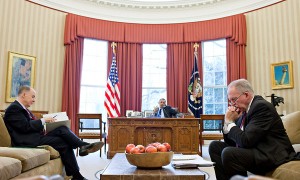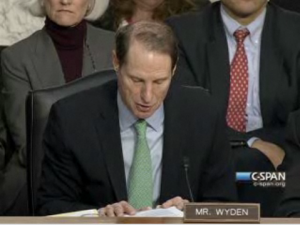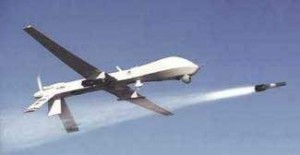Assume Obama Drone Rules Dead
There’s been a series of moves and trial balloons among Obama’s national security lawyers that lead me to assume that any effort to apply some regularity and the patina of legality to the drone program is dead.
First, after some reporting that he might replace Eric Holder as Attorney General, DOD General Counsel Jeh Johnson instead announced his resignation, effective the moment the New Year’s ball drops.
Mr. Johnson, who was general counsel to the Air Force during the Clinton administration, was a key legal adviser and fund-raiser for then-Senator Obama during his run for the presidency in the 2008 campaign. On Thursday, he sent Mr. Obama a letter saying that he would resign effective midnight on Dec. 31.
“Thank you for the opportunity to be part of your campaign, your transition, and your Administration,” Mr. Johnson wrote. “Thank you also for the best clients I will ever have: Robert Gates, Leon Panetta, and the men and women of the U.S. military.”
Mr. Johnson, a former prosecutor, has been mentioned as a potential attorney general should Eric H. Holder Jr. step down in Mr. Obama’s second term. That speculation has been centered more among his colleagues in the Pentagon rather than among civilian law enforcement officials, however.
In his current job, Mr. Johnson worked closely on internal debates about the scope and limits of the government’s power to hold terrorism suspects in indefinite detention and to target them with drone strikes in places like Yemen and Somalia. In those debates he generally sought broader latitude for the government than some others, notably State Department officials.
But Mr. Johnson took a more restrained position than some colleagues during the NATO-led air war in Libya. As American participation in the effort neared an apparent 60-day limit imposed by the War Powers Resolution for hostilities that had not been authorized by Congress, he urged pulling back on direct combat activities – like missile strikes – but was overruled by the White House.
Now, as Charlie Savage notes, the reports that Johnson might be named Attorney General seemed to come from Johnson’s backers, not the White House. And as Savage reports, Johnson’s role has been mixed. While he pushed for more flexibility–particularly with drones themselves–he did try to hew to rule of law in other areas. And he recently suggested that the AUMF the government has operated under will one day (I would argue, already has) effectively been vacated because core al Qaeda has been disrupted so thoroughly.
I do believe that on the present course, there will come a tipping point – a tipping point at which so many of the leaders and operatives of al Qaeda and its affiliates have been killed or captured, and the group is no longer able to attempt or launch a strategic attack against the United States, such that al Qaeda as we know it, the organization that our Congress authorized the military to pursue in 2001, has been effectively destroyed.
At that point, we must be able to say to ourselves that our efforts should no longer be considered an “armed conflict” against al Qaeda and its associated forces; rather, a counterterrorism effort against individuals who are the scattered remnants of al Qaeda, or are parts of groups unaffiliated with al Qaeda, for which the law enforcement and intelligence resources of our government are principally responsible, in cooperation with the international community – with our military assets available in reserve to address continuing and imminent terrorist threats.
Once core al Qaeda has been decimated (which they have been), Johnson said, the military must become solely a reserve force, with intelligence and law enforcement leading the fight.
In many ways, the speech reads, in hindsight, like a valedictory, listing Johnson’s personal accomplishments at DOD (notably, the repeal of Don’t Ask Don’t Tell). But it also calls for conventional legal limits to the war on terror.
And then, days after delivering that speech, Johnson was not only not named to replace Holder, but was himself on the way out the door.
Then the day after Johnson’s departure announcement, came State Department Counselor Harold Koh’s.
That one I find more troubling. While it might just be tied to Yale’s desire to have Koh do his job again (though those transitions usually happen in August, not December), and while Hillary’s departure may explain Koh’s departure (though Hillary isn’t leaving for some time yet), Koh’s departure comes just weeks after Scott Shane’s report that the attempt to put order to the drone program–which had first been reported before the election–had stalled after the election. I suggested then that the Shane report might be an effort from those trying to put more legal regularity to the drone program–an effort undoubtedly led by Koh–to force John Brennan to carry through on his earlier plans. Matthew Aid confirmed that the drone rules, at least, if not the leak to Shane, came from those in State (again, this must be Koh) and DOJ who recognized the drone program didn’t really fly under international law.
A State Department official who recently left his post for a better paying job in the private sector admitted that there is deep concern at State and Justice that sooner or later, a court in the U.S. or in The Hague will issue a ruling on the question of the legality of these missions, which many in Washington fear will go against the U.S. government position that these strikes are legal.
So whether Koh left because he lost this fight with Brennan or because of academic schedules and Hillary’s upcoming departure, in his absence, the drone rules Koh pushed for are far less likely to happen.
Then there’s the news–this one, unlike reports of Johnson as Attorney General, sourced to the Administration itself–that Stephen Preston, currently CIA’s General Counsel, may replace Johnson at DOD.



